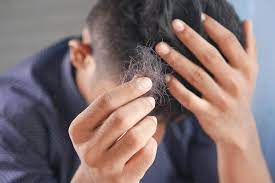
Stress, a ubiquitous part of modern life, can have profound effects on our overall well-being, and its impact extends beyond just mental and emotional health. The intricate connection between stress and the scalp is a subject gaining increasing attention. From exacerbating existing scalp conditions to contributing to new issues, stress can manifest itself visibly on the scalp. In this comprehensive guide, we will delve into the complex relationship between stress and the scalp, exploring the mechanisms, common manifestations, and effective strategies for managing stress-related scalp concerns.
Understanding the Physiological Connection:
The skin, including the scalp, is a dynamic organ influenced by various physiological processes. When the body experiences stress, whether acute or chronic, it triggers a cascade of responses that can affect the health of the scalp:
- Hormonal Changes: Stress prompts the release of hormones such as cortisol and adrenaline. Elevated cortisol levels, in particular, can impact the sebaceous glands on the scalp, leading to increased oil production.
- Blood Flow and Oxygenation: Chronic stress can compromise blood circulation, reducing the delivery of oxygen and nutrients to the hair follicles. This diminished blood flow can contribute to weakened hair follicles and hair thinning.
- Inflammation: Stress triggers an inflammatory response in the body, and the scalp is not exempt. Inflammation on the scalp can manifest as redness, itching, and discomfort.
- Immune System Function: Prolonged stress can suppress the immune system, making the scalp more susceptible to infections, including fungal infections that contribute to dandruff.
Common Scalp Issues Exacerbated by Stress:
- Dandruff and Seborrheic Dermatitis: Stress can worsen existing dandruff or seborrheic dermatitis, conditions characterized by flaky, itchy scalp. The overproduction of sebum during stressful periods can contribute to these concerns.
- Hair Loss:Telogen effluvium, a type of hair loss, can be triggered by stress. This condition leads to a disproportionate number of hair follicles entering the resting (telogen) phase, resulting in increased shedding.
- Psoriasis and Eczema: Individuals with psoriasis or eczema on the scalp may experience flare-ups during periods of heightened stress. Stress can exacerbate these chronic skin conditions, leading to increased inflammation.
- Alopecia Areata: An autoimmune condition that causes hair loss in patches, alopecia areata, can be triggered or worsened by stress. The immune system mistakenly attacks hair follicles, leading to hair loss.
- Tension and Migraine Headaches: Stress-induced muscle tension can contribute to tension headaches, and when this tension is concentrated in the scalp and neck, it may result in migraine headaches.
Manifestations of Stress on the Scalp:
- Excessive Oiliness: Stress can stimulate the sebaceous glands on the scalp, leading to an overproduction of oil. This excessive oiliness can contribute to greasy dandruff and worsen conditions like seborrheic dermatitis.
- Flaky Scalp: Stress-related fluctuations in hormones and immune system activity can contribute to flaky scalps. This may manifest as dandruff or exacerbate existing dandruff conditions.
- Itching and Discomfort: Increased inflammation and heightened sensitivity during periods of stress can lead to itching and discomfort on the scalp. Scratching, in turn, can worsen existing scalp issues.
- Hair Thinning and Shedding:Telogen effluvium, triggered by stress, can lead to noticeable hair thinning and increased shedding. Stress-induced hormonal changes can also contribute to pattern hair loss.
- Redness and Inflammation: Chronic stress can contribute to inflammation on the scalp, leading to redness and discomfort. This is particularly relevant for individuals with conditions like psoriasis or eczema.
Effective Strategies for Managing Stress-Related Scalp Concerns:
- Stress Reduction Techniques: Implement stress reduction techniques such as meditation, deep breathing exercises, yoga, or mindfulness. These practices can help lower cortisol levels and promote overall well-being.
- Regular Exercise: Engaging in regular physical activity is known to reduce stress levels. Exercise promotes blood circulation, which can benefit the scalp by ensuring an adequate supply of nutrients and oxygen.
- Adequate Sleep: Prioritize getting sufficient sleep each night. Quality sleep is crucial for overall health, and it plays a role in maintaining a balanced hormonal system.
- Balanced Diet: Adopt a balanced and nutritious diet rich in vitamins, minerals, and antioxidants. Nutrients such as B-vitamins, zinc, and omega-3 fatty acids are particularly important for hair and scalp health.
- Hydration: Stay well-hydrated to support overall skin health, including the scalp. Water helps in flushing out toxins and maintaining optimal bodily functions.
- Scalp Massage: Regular scalp massage can promote relaxation and improve blood circulation. Use gentle circular motions to massage the scalp, releasing tension and enhancing nutrient delivery to the hair follicles.
- Natural Remedies: Consider incorporating natural remedies with anti-inflammatory properties, such as aloe vera or tea tree oil, to soothe the scalp. However, individual responses may vary, so it’s advisable to test a small area first.
- Professional Help: If stress-related scalp issues persist or worsen, seeking professional help is crucial. Dermatologists and trichologists can provide personalized advice and recommend appropriate treatments.
Conclusion:
The connection between stress and the scalp is undeniable, and understanding this relationship is key to effective management. By adopting stress-reduction strategies and implementing good scalp care practices, individuals can mitigate the impact of stress on their scalps. Recognizing the signs early, seeking professional guidance when needed, and adopting a holistic approach to well-being contribute to a healthier scalp and, in turn, a more resilient response to the stresses of life.
Elevate your hair and scalp health with the best treatment in Vadodara. Our specialized care ensures a rejuvenated scalp and luscious locks. Uncover the secret to a vibrant mane!


